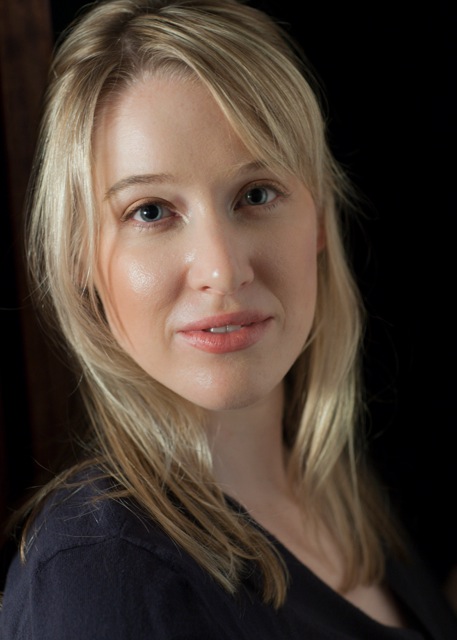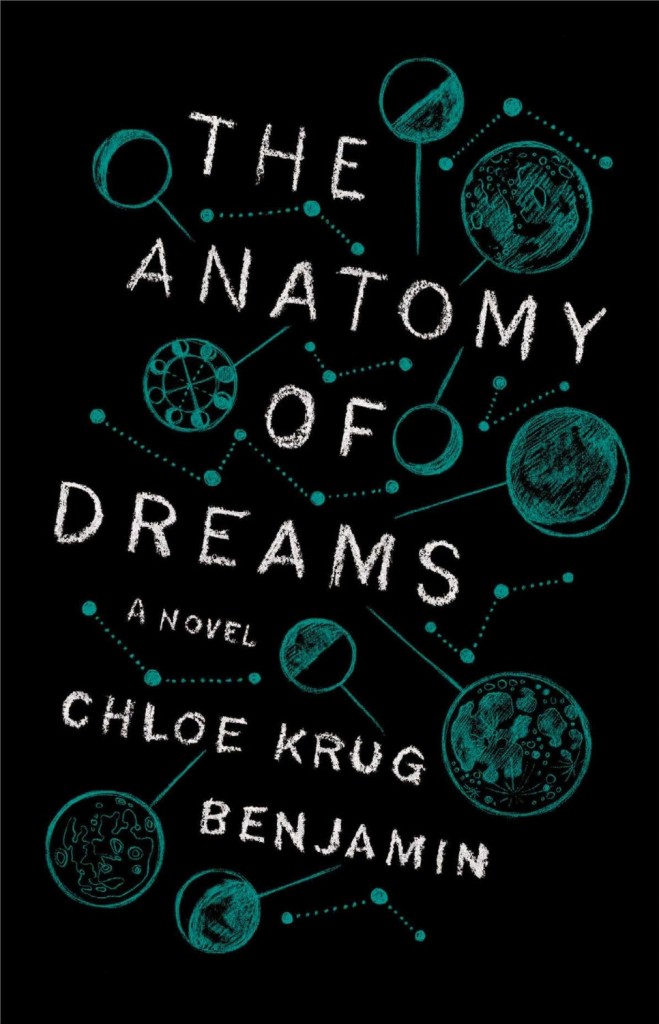Interview: Chloe Krug Benjamin
 Midwestern Gothic staffer Jon Michael Darga talked with author Chloe Krug Benjamin about her upcoming novel The Anatomy of Dreams, relocating to the Midwest, the most influential book she’s ever read, and more.
Midwestern Gothic staffer Jon Michael Darga talked with author Chloe Krug Benjamin about her upcoming novel The Anatomy of Dreams, relocating to the Midwest, the most influential book she’s ever read, and more.
**
Midwestern Gothic: First thing’s first, what is your connection to the Midwest?
Chloe Krug Benjamin: I came here to pursue my MFA in fiction at the University of Wisconsin-Madison in 2010. I was three months out of college and petrified to teach—UW was the only program I applied to that required it—but I soon fell in love with it, and with Madison in general: the lakes, the people, the cheese curds, even the frigid, gorgeous winters. When I first moved here, I thought I’d go back to San Francisco after my program finished, but I couldn’t leave! It helped that this was where I met my fiancé, who is now in the later stages of an English PhD at UW, but I also feel at home here in a way that I wanted for a long time but hadn’t found before.
MG: You grew up in San Francisco, went to college in New York and then moved to the Midwest—have you found that these regions have had affects on your writing?
CKB: I’ve never totally agreed with the directive to write what you know, because fiction presents such unique opportunities for imagination and empathy. But I do find that when it comes to setting, I tend to write about places I’ve lived. San Francisco was where I was born and raised, so much of my fiction is set there, but my novel is set in Madison, and an earlier project took place in upstate New York. Over time, I think, you become attuned to the nuances and quirks of a place almost the way you would a partner. It’s really tough to do this for a place I’ve never been.
MG: Having lived in the Midwest for some time now, what do you think defines this place?
CKB: The Midwest has a spirit that I haven’t encountered anywhere else, an ethos of friendliness and openness and collaboration that has, cheesy as it sounds, made me a better person. I’m more able to strike up a conversation with a stranger, more aware of the importance of connectedness. There’s also a lot of diversity in the Midwest—political, social, economic—that often goes unacknowledged. I think there’s this idea that the Midwest is more passive and less dynamic than other parts of the country, which couldn’t be further from the truth; it’s a region characterized by cultural and climatic extremes. The 2011 protests against Scott Walker were a reminder of how passionate, engaged and divided Wisconsin is right now.
MG: Can you tell us about your upcoming novel, The Anatomy of Dreams?
CKB: Okay, here’s the fancy version: The novel follows a couple—narrator Sylvie Patterson and her boyfriend, Gabe—who meet at a Northern California boarding school called Mills. Mills is run by Dr. Adrian Keller, a charismatic researcher who has staked his career on the therapeutic potential of lucid dreaming: he believes that the dreaming mind has the power to unlock our greatest fears, our self-destructive tendencies, and resolve them. Over the next six years, Sylvie and Gabe become increasingly involved in Keller’s work, following him from the redwood forests of Eureka, California, to the coast of New England. When Keller receives a commission from the University of Wisconsin-Madison, the trio settles in Madison. There, Sylvie stumbles into a tangled, dangerous relationship with the young couple who live next door, and she begins to doubt the ethics of Keller’s research. As she navigates the hazy, permeable boundaries between what is real and what isn’t, she faces surprising developments in herself: an unchecked infatuation, a growing curiosity about Keller’s past, and a new sense of rebellion.
I’ve always been fascinated by dreams, but I also knew that stories about dreams can be a bit of a buzz kill, both in writing and real life—they’re rarely as interesting to anyone else as they are to the dreamer, and I worried that a reader might tune out during the dream sequences. So the book felt like an exciting challenge—how can I write a novel about dreams that feels applicable and engaging to wide audience? How far can I push the limits of a plot about experimental dream research while keeping the novel firmly planted in today’s world?
MG: Can you talk a little bit about the process you went through to get the novel published?
CKB: It began about three years ago, when my agent sent out a novel-in-stories that I finished during the MFA. It was rejected by 19 editors, which was heartbreaking. My fiancé and his best friend threw me a rejection party with balloons and a banner and salty snacks, which I love, and I ate the salty snacks and cried. Looking back, though, it was a hugely important experience, one that taught me why and how my writing wasn’t working. It also taught me about the kind of mindset you need to be a writer, which is twofold: there has to be a practicality and a humility about the inevitability of rejection, the frequency of it, but paradoxically, you also have to have this absurd, unwavering faith in your work—in the possibility that it will beat those odds.
The week after we got those rejections, I started what would become The Anatomy of Dreams. My agent and I went through at least three rounds of revision before we submitted it to publishers, and when it sold to Atria, an imprint of Simon & Schuster, it was so much more meaningful than if I had sold that first book. And then the fun stuff started! I did another few rounds of revision with my editor, Daniella, with whom I’ve really enjoyed working—after spending years alone with this book, it’s been a new and exciting experience to work collaboratively. I’m learning so much about the publishing process, from covers to copyedits to marketing, and having the support of Simon & Schuster has been fantastic.
 MG: The Anatomy of Dreams is your first novel, and you’ve had a long history of publishing poetry. Have you found your poetic experience influencing your prose writing style? For you, does writing poetry versus prose require a different sort of thinking?
MG: The Anatomy of Dreams is your first novel, and you’ve had a long history of publishing poetry. Have you found your poetic experience influencing your prose writing style? For you, does writing poetry versus prose require a different sort of thinking?
CKB: Before grad school, I had only written fiction, but at UW, the MFAs are required to teach a creative writing class that incorporates both fiction and poetry. I bumbled my way through that first semester, and then I signed up for Amy Quan Barry’s MFA poetry workshop, which had somewhat terrifyingly been nicknamed “Poetry Bootcamp.” And it was! I came out with a few half-decent poems and a huge appreciation for poetry—that density of language, the concentrated intent of it, is incredibly difficult. At that point, I still hadn’t gotten a short story published, so I started refining and sending out poems. I was thrilled when they started to get taken, but in a strange way, it was humbling, too—the fiction-oriented trajectory I thought my career would have was not what happened. It made me return to my fiction with a sharper eye, and hold it to a higher standard.
MG: You are also active with a non-profit and run a writing group for pre-teen girls. What drew you to these? Have they, in turn, inspired you/drawn you to certain types of stories or writing?
CKB: During the MFA, I taught college students, and I continued to adjunct after I finished. But it’s so hard to make a living out of adjuncting, so after a couple of semesters I found my way to a nonprofit called ALS Worldwide, which supports patients and families navigating Amyotrophic Lateral Sclerosis (also known as Lou Gehrig’s disease). Serving that community has been humbling and eye-opening, especially as a counter to writing, which can feel so solitary and self-fulfilling. As a writer, you hope that your work affects people, that your book finds its way into the hands of readers for whom it offers solace or companionship, but you’re quite removed from that process. Teaching and nonprofit work has pulled me out of my own head and put me into contact with the real world, and I’m very grateful for that.
MG: Judging from your blog posts, you have a pretty eclectic reading list—from Anna Karenina to The Handmaid’s Tale to Gone Girl. What is the most influential book you’ve read?
CKB: I’m constantly inspired by other writers—it’s what keeps me motivated. My heart is probably in good old character-driven literary fiction, but I also love YA, fantasy, and speculative fiction, as well as books that bend or defy genres in the first place. Some of the books I’ve read recently and loved are Arcadia by Lauren Groff, The Magicians by Lev Grossman, Meg Wolitzer’s The Interestings and The Virgins by Pamela Erens. Margaret Atwood gets me every time—I read The Handmaid’s Tale for the first time this year, and it gutted me. I’m also a huge fan of Lorrie Moore; the opportunity to study with her was part of what brought me to UW-Madison. Another person I’ve turned to for inspiration throughout my writing life is Alice Munro. Her restraint and economy are incredible—her stories house such full, bustling worlds, as if by magic—but it’s her commitment to the raw, unadorned stories of real people that I love most. Her refusal to add in bells and whistles for shock value is what gives her stories their power; human reality is dramatic enough.
MG: The jewelry that you make seems to have a sort of mystical, ethereal, dream-like quality to it. Would you say that this is something you’ve found yourself drawn to for some time, given the subject matter of your novel?
CKB: That’s a great question! I started making jewelry on the side while in my MFA and struggling to make ends meet. I haven’t thought about the parallels between it and my writing, as I tend to think of them as being very separate, but I think you’re right.
MG: What’s next for you?
CKB: I’m slowly finding my way to a second novel, though the process hasn’t been easy. How in the world do you start a novel? It seems to be a mystery no matter how many times you’ve already done it. In the meantime, I’m sprucing up some stories and a novella, keeping up with my day job, and sending out holiday orders for the jewelry business. And planning a wedding. And drinking lots of coffee!
**
Born in San Francisco, CA, Chloe Krug Benjamin is a graduate of Vassar College and of the University of Wisconsin-Madison, where she received her M.F.A. in fiction. The Anatomy of Dreams, her first novel, will be published by Atria/Simon & Schuster in September 2014. Her fiction, poetry and nonfiction has been published in PANK, The Washington Independent Review of Books, Whiskey Island, The Laurel Review, Tar River Poetry, and Devil’s Lake, among others. She can be found on twitter @chloekbenjamin and at www.chloekrugbenjamin.com.






